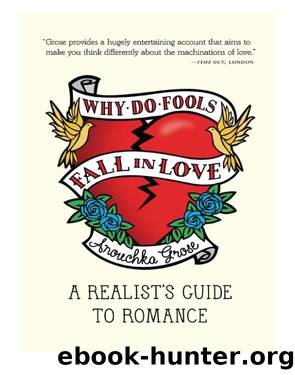Why Do Fools Fall In Love by Anouchka Grose

Author:Anouchka Grose
Language: eng
Format: epub
Publisher: Tin House Books
Published: 2011-02-21T00:00:00+00:00
TILL THE SURREAL THING COMES ALONG
So is this still the state of the art where love, sex and commitment are concerned? Try before you buy and hope they werenât putting on an act to trick you? In practice, this appears to be what people actually do, but is it the last word on the subject? In his book The Century, Alain Badiou suggests a serious alternative. In his chapter on avant-gardes he tells us, âThe [twentieth] century has been a great century for the vision of love as a figure of truth, which is entirely different from romanticismâs fatalist and fusional conception of love.â In other words, in the past you fell madly in love and stuck together in sickness and in health, for better or worse, etc. You went wild with desire, then grinned and bore it until you dropped dead. But in the twentieth century love became something more of an open question. It was no longer about accepting the consequences of it, but about letting it be a more volatile and open-ended state. You didnât have to get stuck with a single notion of what love involved but could allow it to be whatever it seemed to want to be. Badiou formulates his ideas using a passage from André Bretonâs surrealist text Arcanum 17, in particular the following sentence: âAnd I know that the love which at this point counts on nothing but itself does not recover and that my love for you is reborn from the ashes of the sun.â
Badiou is writing about twentieth-century art movements and the ways in which artists managed to make radical breaks with their predecessors. Rather than accepting and repeating received ideas about beauty and form, artists throughout the twentieth century put these very ideas in question in order to rethink what art could be. This sort of revolutionary art activity is discussed in the context of political revolution, raising the question of whether thereâs any point in rebellions and over-turnings. Is the upset of political revolution ever really justified by the results, or is it ultimately better to knuckle down and do the best you can with whatâs on offer? Breton and Badiouâs answer is that the importance of revolution isnât in its measurable results, but in the act itself. If something has to change, then itâs not your job to make sure it changes into something perfect. You just have to change it, and the act of change will almost necessarily be exhilarating. Avant-gardes in art donât seriously aim to âimproveâ art in the long runâalthough they may aim to open things up by toppling a dominant set of ideas. The point in revolution is to access a certain kind of extremely fragile and slippery truth; to stop life becoming a series of empty gestures. The aim isnât to solve the problem once and for all, but to create a space for something to feel somehow real, if only temporarily.
Itâs possible to see how all these ideas might also
Download
This site does not store any files on its server. We only index and link to content provided by other sites. Please contact the content providers to delete copyright contents if any and email us, we'll remove relevant links or contents immediately.
The 5 Love Languages: The Secret to Love That Lasts by Gary Chapman(9792)
Doing It: Let's Talk About Sex... by Hannah Witton(9277)
Should I Stay or Should I Go? by Ramani Durvasula(7658)
The Road Less Traveled by M. Scott Peck(7594)
The Lost Art of Listening by Michael P. Nichols(7494)
Daring Greatly by Brene Brown(6504)
Beartown by Fredrik Backman(5737)
We Need to Talk by Celeste Headlee(5608)
Men In Love by Nancy Friday(5234)
The Rules Do Not Apply by Ariel Levy(4957)
The State of Affairs by Esther Perel(4712)
How To Win Friends and Influence People by Dale Carnegie(4505)
Reflections Of A Man by Mr. Amari Soul(4288)
Pillow Thoughts by Courtney Peppernell(4272)
The Ethical Slut by Janet W. Hardy(4243)
Algedonic by r.h. Sin(4056)
Surrounded by Idiots by Thomas Erikson(4039)
He's Just Not That Into You by Greg Behrendt & Liz Tuccillo(3891)
I Love You But I Don't Trust You by Mira Kirshenbaum(3868)
